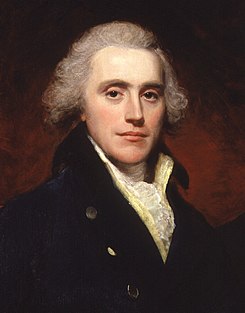Henry Addington, 1st Viscount Sidmouth
|
The Right Honourable The Viscount Sidmouth PC |
|
|---|---|

Portrait by Sir William Beechey
|
|
| Prime Minister of the United Kingdom | |
|
In office 14 March 1801 – 10 May 1804 |
|
| Monarch | George III |
| Preceded by | William Pitt the Younger |
| Succeeded by | William Pitt the Younger |
| Chancellor of the Exchequer | |
|
In office 17 March 1801 – 10 May 1804 |
|
| Monarch | George III |
| Preceded by | William Pitt the Younger |
| Succeeded by | William Pitt the Younger |
| Lord President of the Council | |
|
In office 14 January – 10 July 1805 |
|
| Monarch | George III |
| Prime Minister | William Pitt the Younger |
| Preceded by | The Duke of Portland |
| Succeeded by | The Earl Camden |
|
In office 8 October 1806 – 26 March 1807 |
|
| Monarch | George III |
| Prime Minister | Spencer Perceval |
| Preceded by | The Earl Fitzwilliam |
| Succeeded by | The Earl Camden |
|
In office 8 April – 11 June 1812 |
|
| Preceded by | The Earl Camden |
| Succeeded by | The Earl of Harrowby |
| Home Secretary | |
|
In office 08 June 1812 – 17 January 1822 |
|
| Preceded by | Richard Ryder |
| Succeeded by | Robert Peel |
| Personal details | |
| Born |
30 May 1757 Bedford Row, Holborn, Middlesex, England |
| Died | 15 February 1844 (aged 86) White Lodge, Richmond, Surrey, England |
| Political party | Tory |
| Spouse(s) | Ursula Hammond (m. 1781; d. 1811) |
| Alma mater | Brasenose College, Oxford |
| Religion | Church of England |
| Signature | |
Henry Addington, 1st Viscount Sidmouth, PC (30 May 1757 – 15 February 1844) was a British statesman who served as Prime Minister from 1801 to 1804. He is best known for obtaining the Treaty of Amiens in 1802, an unfavourable peace with Napoleonic France which marked the end of the Second Coalition during the French Revolutionary Wars. When that treaty broke down he resumed the war but he was without allies and conducted a relatively weak defensive war, ahead of what would become the War of the Third Coalition. He was forced from office in favour of William Pitt the Younger, who had preceded Addington as Prime Minister. Addington is also known for his ruthless and efficient crackdown on dissent during a ten-year spell as Home Secretary from 1812 to 1822. He is the longest continuously serving holder of that office since it was created in 1782.
Henry Addington was the son of Anthony Addington, Pitt's physician, and Mary Addington, the daughter of the Rev. Haviland John Hiley, headmaster of Reading School. As a consequence of his father's position, Addington was a childhood friend of William Pitt the Younger. Addington studied at Reading School, Winchester and Brasenose College, Oxford, and then studied law at Lincoln's Inn.
He was elected to the House of Commons in 1784 as Member of Parliament (MP) for Devizes, and became Speaker of the House of Commons in 1789. In March 1801, William Pitt the Younger resigned from office, ostensibly over the refusal of King George III to remove some of the existing political restrictions on Roman Catholics in Ireland (Catholic Emancipation), but poor health, failure in war, economic collapse, alarming levels of social unrest due to famine, and irreconcilable divisions within the Cabinet also played a role. Both Pitt and the King insisted that Addington take over as Prime Minister, despite his own objections, and his failed attempts to reconcile the King and Pitt.
...
Wikipedia
